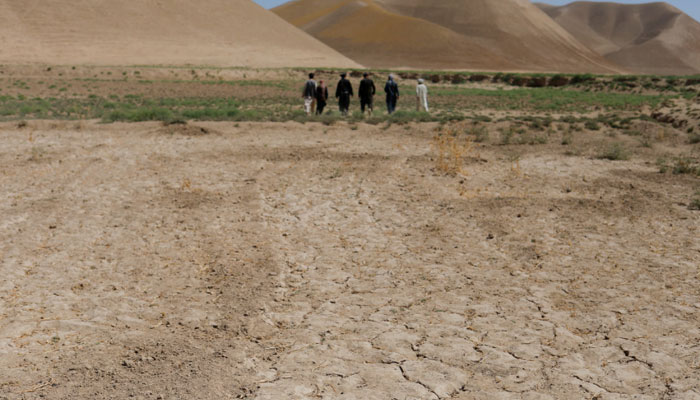UN to unlock Afghanistan climate financing
KABUL/BAKU: United Nations agencies are trying to unlock key climate financing for Afghanistan, one of the world’s most vulnerable countries to climate change which has not received approval for any fresh such fundssince the 2021 Taliban takeover, two U.N. officials told Reuters.
Plagued by drought and deadly floods, Afghanistan has been unable to access U.N. climate funds due to political and procedural issues since the former insurgents came to power.
Two U.N. agencies are currently drawing together proposals they hope to submit next year to shore up nearly $19 million in financing from the U.N’s Global Environment Facility (GEF), part of the financial mechanism of the 2015 U.N. Paris Agreement on climate change.
These include the FAO, which hopes to get support for a project costing $10 million that would improve rangeland, forest and watershed management across up to four provinces in Afghanistan while avoiding giving money directly to Taliban authorities.
The U.N. Development Programme, meanwhile, hopes to secure $8.9 million to improve the resilience of rural communities where livelihoods are threatened by increasingly erratic weather patterns, the agency told Reuters. If that goes ahead, it plans to seek another $20 million project.
National governments often work alongside accredited agencies to implement projects that have received U.N. climate funds. But because the Taliban government is not recognised by U.N. member states, U.N. agencies would both make the request and serve as the on-the-ground partner to carry out the project.
A Taliban administration spokesperson did not respond to requests for comment.
“If one of the countries most impacted by climate change in the world cannot have access to (international climate funds), it means something isn’t working,” Rodriques said, adding that any funds should come alongside continued dialogue on human and women’s rights.
Flash floods have killed hundreds in Afghanistan this year, and the heavily agriculture-dependent country suffered through one of the worst droughts in decades that ended last year. Many subsistence farmers, who make up much of the population, face deepening food insecurity in one of the world’s poorest countries.
The FAO and UNDP will need to receive initial approvals by the GEF secretariat before they can submit their full proposals for a final decision from the GEF Council, which comprises representatives from 32 member states.
If the agencies get that first green light, Trenchard said, they would aim to submit their proposals in early 2025.
We “are awaiting guidance as to whether it would be possible to proceed,” Trenchard said.
Taliban members are attending the ongoing annual U.N. climate negotiations COP29 in Baku, Azerbaijan as observers for the first time, Reuters has reported.
The Taliban’s presence could build trust between Afghanistan and international donors, said Abdulhadi Achakzai, founder of the Afghanistan climate nonprofit Environmental Protection Trainings and Development Organization, on the sidelines of COP29.
“It will be a safer world for the future to include Afghanistan officially in the agenda,” he said. “We see this is an opportunity. There are funds for Afghanistan, we just need to secure it.”
-
 Anti-monarchy Group Reacts To Prince William, Kate Middleton Statement On Epstein Scandal
Anti-monarchy Group Reacts To Prince William, Kate Middleton Statement On Epstein Scandal -
 Andrew 'must' Apologize Not Wider Royal Family For Jeffrey Epstein Links
Andrew 'must' Apologize Not Wider Royal Family For Jeffrey Epstein Links -
 Super Bowl 2026: Why Didn't Epstein Survivors Ad Air On TV?
Super Bowl 2026: Why Didn't Epstein Survivors Ad Air On TV? -
 'Harry Potter' TV Series Exec Teases 'biggest Event In Streaming': Deets
'Harry Potter' TV Series Exec Teases 'biggest Event In Streaming': Deets -
 Camila Mendes Finally Reveals Wedding Plans With Fiancé Rudy Mancuso
Camila Mendes Finally Reveals Wedding Plans With Fiancé Rudy Mancuso -
 Beatrice, Eugenie Blindsided By Extent Of Sarah Ferguson’s Epstein Links
Beatrice, Eugenie Blindsided By Extent Of Sarah Ferguson’s Epstein Links -
 Girl And Grandfather Attacked In Knife Assault Outside Los Angeles Home
Girl And Grandfather Attacked In Knife Assault Outside Los Angeles Home -
 Super Bowl Halftime Show 2026: What Did Trump Say About Bad Bunny?
Super Bowl Halftime Show 2026: What Did Trump Say About Bad Bunny? -
 Piers Morgan Defends Bad Bunny's Super Bowl Performance, Disagrees With Trump Remarks
Piers Morgan Defends Bad Bunny's Super Bowl Performance, Disagrees With Trump Remarks -
 Andrew Lands In New Trouble Days After Royal Lodge Eviction
Andrew Lands In New Trouble Days After Royal Lodge Eviction -
 Instagram, YouTube Addiction Case Trial Kicks Off In California
Instagram, YouTube Addiction Case Trial Kicks Off In California -
 Agentic Engineering: Next Big AI Trend After Vibe Coding In 2026
Agentic Engineering: Next Big AI Trend After Vibe Coding In 2026 -
 Keke Palmer Makes Jaw-dropping Confession About 'The Burbs'
Keke Palmer Makes Jaw-dropping Confession About 'The Burbs' -
 Cher Sparks Major Health Concerns As She Pushes Herself To Limit At 79
Cher Sparks Major Health Concerns As She Pushes Herself To Limit At 79 -
 Former NYPD Detective Says Nancy Guthrie's Disappearance 'could Be Hoax'
Former NYPD Detective Says Nancy Guthrie's Disappearance 'could Be Hoax' -
 King Charles Publicly Asked If He Knew About Andrew's Connection To Epstein
King Charles Publicly Asked If He Knew About Andrew's Connection To Epstein




